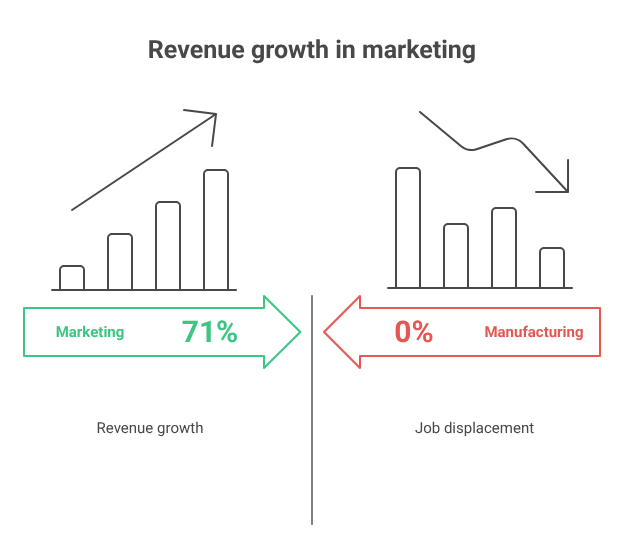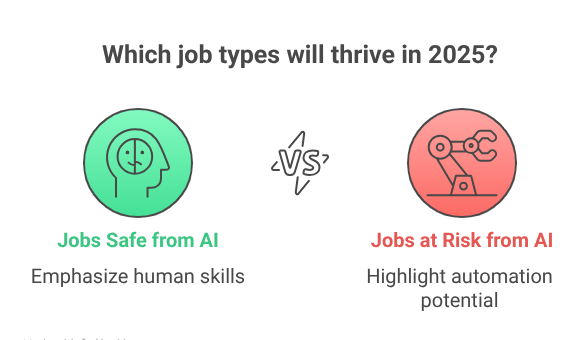The battle of AI vs Humans jobs 2025 is reaching a critical point as artificial intelligence continues to transform our workforce. According to the World Economic Forum, AI could automate 85 million jobs by 2025. However, this technological revolution isn’t just about job losses—97 million new roles are expected to emerge during the same period.
As we navigate this evolving landscape, the question “Which jobs are safe from AI?” becomes more urgent. A staggering 78% of global companies now report actively using AI, up from 55% the previous year. While 30% of U.S. work hours may be automated by 2030, there’s a surprising optimism—49% of companies believe AI will create more jobs, versus 23% predicting job loss.
This article explores:
- Jobs at risk from automation
- Careers that are AI-proof
- AI job displacement trends
- Future jobs not replaced by AI
- The AI-driven skills you need in 2025
How AI is Reshaping the Job Market in 2025

In 2025, AI adoption in the workplace has reached unprecedented levels. Revenue growth in AI-exposed industries has surged since the launch of ChatGPT 3.5 in 2022, fundamentally transforming operations across business functions. AI vs Humans Today, 78% of companies use AI in at least one area.
The workplace skills gap is widening. By 2030, 70% of job skill requirements will shift. Employers are responding: 50% are prioritizing upskilling, and two-thirds are hiring for AI-specific roles, highlighting the growing importance of AI literacy.
AI vs Humans to McKinsey, marketing and sales departments are leading the way in generative AI adoption—71% of users report revenue growth. Meanwhile, service operations are seeing cost reductions with AI. These changes are reshaping traditional career paths, particularly for entry-level jobs.
AI agents—automated digital workers—now manage customer queries, generate software drafts, and even build prototypes. This shift demands new management roles and introduces AI vs Humans collaboration into workforce planning.
While manufacturing jobs face widespread AI job displacement, industries like healthcare and education are projected to see growth. Meanwhile, younger workers (ages 18–24) are 129% more likely to fear AI replacing their job FAQs
Q1. How will AI impact job markets by 2025?
AI will automate around 85 million jobs but create 97 million new ones. Industries adopting AI see higher wage growth, especially in roles that demand AI literacy and prompt engineering.
Q2. Which jobs are most at risk from AI automation?
Roles involving routine data entry, customer service, retail, and legal support are among the most vulnerable. Even creative jobs face disruption from AI-generated content.
Q3. What careers are likely to remain safe from AI in the near future?
Jobs in healthcare, skilled trades, education, and creative professions remain secure due to their reliance on emotional intelligence, creativity, and physical adaptability.
Q4. How are companies adapting to the rise of AI in the workplace?
By 2025, 78% of businesses use AI in at least one function. Employers are prioritizing upskilling their workforce’s AI skills and creating hybrid human-AI roles.
Q5. What skills will be most valuable in an AI-driven job market?
The top skills include AI literacy, critical thinking, adaptability, creativity, and emotional intelligence—all essential for thriving in an AI-augmented workplace. compared to older generations.
Jobs at Risk from AI and Automation
Unlike previous automation waves, today’s AI targets white-collar and knowledge-based work, putting new segments at risk.
Data-Intensive and Administrative Jobs
- Around 60% of administrative tasks can now be automated.
- AI systems handle structured data with 99% accuracy.
- Roles like data entry clerks, bookkeepers, and financial analysts are highly automatable.
Customer Service
- AI agents now offer 24/7 support.
- Within 2–3 years, AI could handle up to 80% of customer service interactions.
- This change threatens call centers and front-line support jobs.
Retail Automation
- Cashier positions are expected to drop 10% between 2021 and 2031.
- AI automates inventory, pricing, and checkouts via frictionless retail systems.
Legal Services
- AI is already performing contract analysis and legal research with up to 90% accuracy.
- Roles such as paralegals are vulnerable.
Creative Roles
- AI-generated content challenges copywriters, graphic designers, and journalists.
- A 2024 Pew study projects 30% of media jobs may be automated by 2035.
Programming & IT
- By 2040, 40% of coding tasks could be handled by AI.
- Companies are using AI to increase product quality (58%), output (49%), and reduce labor costs (47%).
Jobs Safe from AI in 2025

Despite automation, many jobs safe from AI will continue to thrive in 2025. These roles rely on empathy, judgment, creativity, and manual dexterity—traits machines cannot replicate.
Healthcare
- Nurse practitioners: +45.7% growth expected by 2032.
- Physician assistants: +27.6% growth.
- Healthcare demands ethical decisions, empathy, and adaptability.
Creative Professions
- Roles like choreographers, musicians, and writers require cultural and emotional intelligence.
- These careers involve human emotion and originality, making them resistant to AI.
Skilled Trades
- Electricians, plumbers, and HVAC technicians perform tactile work in non-standard environments.
- No AI can match the fine motor skills and on-the-fly decision-making of human tradespeople.
Education
- Teachers offer guidance, emotional support, and serve as mentors—roles impossible to automate fully.
- The relationship-building nature of teaching keeps it AI-proof.
AI Industry Roles
- Jobs like machine learning engineers, AI ethics specialists, and AI operations managers are growing.
- Ironically, AI is creating jobs that only humans can perform responsibly.
Leadership & Strategic Roles
- Executives and managers excel through vision, ethics, and leadership—areas AI cannot mimic.
What Skills Will Be Most Valuable in an AI-Driven Market?
The most in-demand skills by 2025 are those that complement AI, not compete with it. These include:
- AI literacy and prompt engineering
- Critical thinking
- Emotional intelligence
- Creativity and innovation
- Complex problem-solving
- Adaptability and lifelong learning
- Interpersonal and communication skills
Conclusion: AI vs Humans Jobs 2025—Adapt, Don’t Resist
The AI vs Humans job landscape in 2025 is both a challenge and an opportunity. While 85 million jobs are at risk, 97 million new ones will be created in return.
To stay competitive:
- Embrace AI upskilling.
- Focus on human-first roles that require empathy and creativity.
- Cultivate AI-proof skills for 2025.
- View AI not as a threat, but as a tool for greater innovation.
The next five years will redefine what it means to work—and thrive—in a world where AI vs Humans coexist.
FAQs
Q1. How will AI impact job markets by 2025?
AI will automate around 85 million jobs but create 97 million new ones. Industries adopting AI see higher wage growth, especially in roles that demand AI literacy and prompt engineering.
Q2. Which jobs are most at risk from AI automation?
Roles involving routine data entry, customer service, retail, and legal support are among the most vulnerable. Even creative jobs face disruption from AI-generated content.
Q3. What careers are likely to remain safe from AI in the near future?
Jobs in healthcare, skilled trades, education, and creative professions remain secure due to their reliance on emotional intelligence, creativity, and physical adaptability.
Q4. How are companies adapting to the rise of AI in the workplace?
By 2025, 78% of businesses use AI in at least one function. Employers are prioritizing upskilling their workforce’s AI skills and creating hybrid human-AI roles.
Q5. What skills will be most valuable in an AI-driven job market?
The top skills include AI literacy, critical thinking, adaptability, creativity, and emotional intelligence—all essential for thriving in an AI-augmented workplace.

